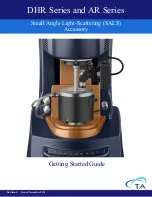
17
Subject to change without notice
coefficient) if turned in the opposite direction (ccw.). The
available range is from 1mV/div up to 20V/div.
The deflection coefficients and additional information
regarding the active channel(s) are displayed in the readout,
e.g.
”Y2: deflection coefficient, input coupling”
. The
”:”
symbolizes calibrated measuring conditions and is replaced
by the
”>”
symbol in uncalibrated conditions.
VAR.:
The vernier (variable) function is described under item
VAR
[19].
[19] CH II - VAR.
– Pushbutton with several functions.
Pressing and holding this pushbutton selects the
VOLTS/
DIV. [18]
control knob function between attenuator and
vernier (variable). The current setting is displayed by the
VAR-LED
located above the knob.
CH II mode:
Briefly pressing the CH II-button sets the instrument to
channel II
(Mono CH II)
mode. The deflection coefficient
displayed in the readout indicates the current conditions
(”Y2...”)
. If neither external nor line (mains) triggering was
active, the internal trigger source automatically switches
over to channel II and the READOUT displays “Y2, trigger
slope, trigger coupling”. The last function setting of the
VOLTS/DIV-
knob
[18]
remains unchanged.
All channel II related controls are active if the
input [28]
is not
set to
GND [29].
VAR.:
After switching the
VAR-LED [18]
on, the deflection coefficient
is still calibrated. Turning the
VOLTS/DIV.-
control knob
[18]
counter clockwise reduces the signal height and the deflection
coefficient becomes uncalibrated.
The readout then displays e.g.
”Y2>...”
indicating the
uncalibrated condition instead of
”Y2:...”
. Pressing and holding
the CHI pushbutton again switches the LED off, sets the
deflection coefficient into calibrated condition and activates
the attenuator function. The previous vernier setting will not
be stored.
INV.:
Briefly and simultaneously pressing the CHII and the DUAL-
MENU (16) pushbutton switches the channel II invert function
on or off. The invert ”on” condition is indicated by the
readout with a horizontal bar above
”Y2”
(Yt mode). The
invert function causes the signal display of channel II to be
inverted by 180°.
[20] TRIG. MODE
– Pushbuttons.
Pressing one of these pushbuttons opens the trigger coupling
Pulldown menu with the actual setting highlighted. Briefly
pressing a pushbutton selects the trigger coupling. Please
note “B: Menu Display and Operation”.
The term “trigger coupling” describes the way the trigger
signal is connected to the trigger unit.
AC:
DC content suppressed,
DC:
peak value detection inactive,
HF:
high pass filter cuts off frequencies below
approx. 50 kHz, trigger point symbol switched off
LF:
low pass filter cuts off frequencies above
approx. 1.5 kHz,
TVL:
TV signal, line pulse triggering,
trigger point symbol switched off,
TVF:
TV signal, frame pulse triggering,
trigger point symbol switched off.
~:
line/mains triggering,
trigger point symbol switched off.
Line/mains triggering inactivates the TRIG. SOURCE-push-
button
[17]
.
In some trigger modes such as alternate triggering, some
trigger coupling modes are automatically disabled and can
not be selected.
[21] DEL.POS. HO LED
– Control knob with double function and
related HO LED.
The
DEL.POS.
-knob has two functions which depend on the
actual time base mode.
1. DEL.POS. (delay position).
In the delay time base modes
“sea” (search), “del”(delay)
and “dTr” (triggered after delay) a delay time between the
trigger event and the start of the trace can be set with the
DEL.POS.
control.
See DEL.MODE
[23].
2. HO (holdoff time).
The holdoff time function can be activated if normal
(undelayed) time base mode is present. On condition that the
HO
LED is not lit the holdoff time is set to minimum. The
HO
LED lights up and the holdoff time increases as the knob is
rotated clockwise. A signal sounds on reaching the maximum
holdoff time. Similarly in the opposite direction until minimum
holdoff time is reached (
HO
LED extinguishes).
The holdoff time is automatically set to minimum when the
time base is changed. (For the application of holdoff time
setting see the paragraph with the same heading).
[22] TIME/DIV.
– Control knob with a double function.
This control can be used for time coefficient selection in 1-2-
5-sequence under calibrated condition when the VAR LED is
not lit or as a vernier (variable) control (VAR LED lit).
Time coefficient setting:
In undelayed, delayed (“del”) and as delayed triggered (“dTr”)
time base mode, this control serves as a time deflection
coefficient selector. Rotating anticlockwise increases the
deflection coefficient and rotating clockwise decreases the
coefficient. The setting is displayed at the top left in the
Controls and Readout
Y-POS / CURS.I
VOLTS / DIV.
CH I
CH II
DEL.MODE
Z-ON/OFF
Y-POS / CURS.II
LEVEL
X-POS.
CURSOR
POS
VOLTS / DIV.
DEL.POS.
TRIG.
SOURCE
DUAL
MENU
TIME / DIV.
20V
1mV
20V
1mV
0.5s
50ns
NM
AT
X-
MAG.
PUSH
BOTH
PUSH
LONG
INV.
VAR.
VAR.
ON
OFF
VAR.
TRIG. MODE
MENU
6
7
9
8
11
13
12
10
14
15
17 19
16
24
21
22 23
20
18
VAR
CUR
VAR
TR
NM
HO
VAR
x10
Summary of Contents for HM504-2
Page 2: ......
Page 3: ...O s c i l l o s c o p e H M 5 0 4 2 Manual English...
Page 39: ...37 Subject to change without notice Front Panel HM504 2...
Page 40: ......
Page 41: ...LEER...
















































